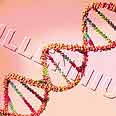
Jews linked genetically
צילום: jupiter
Researchers locate Jewish genetic linkage
New study including dozens of Jews throughout the world finds that Jewish people shares joint genetic history
A new study, the largest of its kind ever conducted, reveals that the Jewish people shares clear genomic significance. Apparently, the genetic similarity between a Jewish Italian and a Jewish Pole is larger than the similarity between Jewish Pole and a Christian Pole, for instance.
"The Jewish communities share much more (genetic information) between Jews rather than non-Jews in the same geographic area," Dr. Gil Atzmon, co-author of the study and professor of genetics at the Albert Einstein College of Genetics, told the New York Post.
Some 237 Jews of representing the three major Diaspora communities, including Ashkenazi Jews from throughout Europe, Sephardim, and Mizrahim from Syria, Iran, and Iraq, participated in the study.
Shared genetic history
The study found that Ashkenazim share genetic density that could suggest that most of them are ancestors of a small number of original mothers. The researchers noted that the level of relatedness among Ashkenazi Jews is similar to the level of relatedness between fifth-degree cousins.This is not the first study attempting to isolate a genetic thread among Jews. However, it is the first to show clear and unequivocal genetic significance. The study, titled "The Children of Abraham in the Genome Era," was recently published in the American Journal of Human Genetics.
"We found that Jewish communities created their own genetic clusters," said Atzmon.
Genetic analysis from the study showed that two major groups of Jews, Middle Eastern Jews and European Jews, diverged nearly 2500 years ago.
"The study supports the idea of a Jewish people linked by a shared genetic history," explained the study's senior author, Prof. Harry Ostrer of New York University.
"The goal of the study was to determine a genomic baseline,” said lead author Gil Atzmon, Ph.D., assistant professor of medicine and of genetics at Einstein. “With this established, we’ll be able to more easily identify genes associated with complex disorders like diabetes that are determined by multiple variants across the genome. Armed with this information, we will be better positioned to treat patients.”










